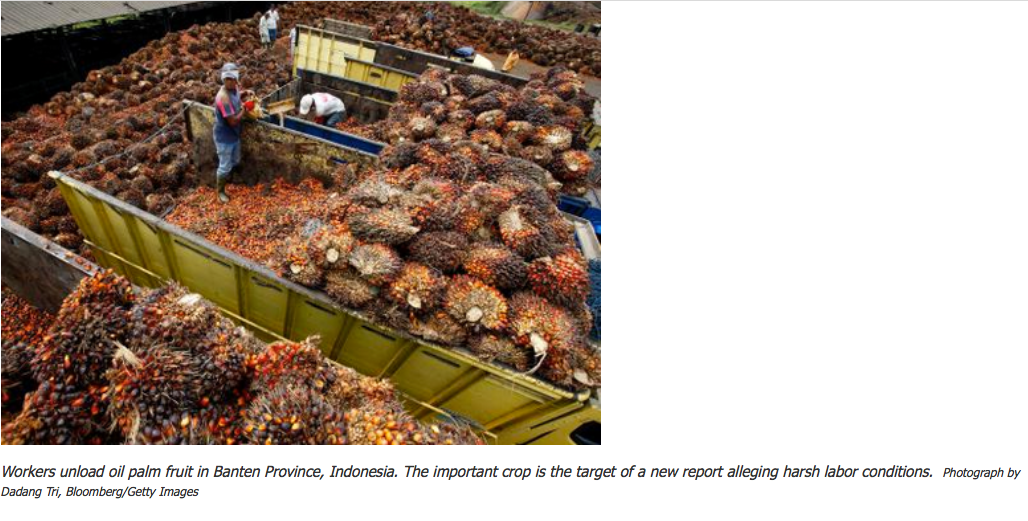National Geographic: Palm Oil’s Human Cost Alleged in New Report (2)
First posted 2016-06-27

Palm Oil’s Human Cost Alleged in New Report
Indonesian plantations are accused of exploitative labor conditions and other harmful practices by a coalition of nonprofit groups.
PUBLISHED

Workers unload oil palm fruit in Banten Province, Indonesia. The important crop is the target of a new report alleging harsh labor conditions. Photograph by Dadang Tri, Bloomberg/Getty Images
Palm oil has oft been criticized for its alleged destructive impact on the environment—including clearing of tropical forests and peat swamps, destroying critical habitat for endangered species like orangutans, and contributing significantly to CO2 emissions. A new report released today adds to that list of impacts by alleging that the industry exploits at least some of its labor force.
The report, “The Human Cost of Conflict Palm Oil,” details the results of an on-the-ground investigation into the conditions of workers on two representative palm oil plantations in Sumatra, Indonesia. The plantations are owned by Indofood, Indonesia’s largest food company and its third largest palm oil producer. It is also a partner of PepsiCo and produces all of PepsiCo’s products in the country.
PepsiCo revised its palm oil policy in September 2015 to require responsible production practices for its suppliers, but the new report alleges that the company’s joint venture partner, Indofood, isn’t following the same standards. PepsiCo has not responded to our requests for comment.
During its two-month investigation, conducted in September and October 2015, researchers from the Indonesian labor organization OPPUK, environmental NGO Rainforest Action Network (RAN), and the human rights advocacy group International Labor Rights Forum (ILRF) interviewed 41 plantation workers across a range of jobs, examined their labor documents such as pay stubs and contracts, and directly observed their work and living conditions.
The report suggests that palm oil may be the cheapest vegetable oil on the market not only because of its high yield per hectare but also because of alleged exploitative employment practices.
Among the report’s findings:
- There is a high reliance on casual and other precarious forms of labor, which cut costs. Roughly 50 percent of workers on the two plantations are casual laborers who do a variety of jobs, from harvesting to caring for the oil palms. Many of these workers lack health care and other benefits and are paid low wages. While casual workers are supposed to be temporary (no more than three months), many have been employed for years without promotion to permanent status.
- Allegedly unrealistic daily quotas set by the company force harvesters to hire helpers, called “kernet workers,” who have no direct employment relationship with companies and are paid by the workers themselves. These invisible workers, notes Robin Averbeck, RAN’s senior palm oil campaigner, “are generally children and women, who are the most vulnerable in terms of rights or protections.”
- Child labor is common on the plantations surveyed. Children often help their parents or other harvesters meet high quotas by collecting fruit and transporting fruit bunches. Typically, the children drop out of school. It’s a vicious circle, as the pay earned by their parents is too low to afford keeping them in school. “Urgent attention needs to be paid to those workers most at risk and least protected—women workers and child laborers—who perhaps suffer the most under the impossibly high quotas and unethically low wages,” says OPPUK’s executive director, Herwin Nasution.
- Workers are exposed to hazardous chemicals. Many of the casual workers are tasked with spraying pesticides and spreading fertilizer, with a disproportionate number of women in these positions. However, they are often not provided with health and safety equipment, and many workers report using the pesticide Gramoxone, which contains Paraquat, a hazardous herbicide banned in many Western countries.
- Workers lack rights, which keeps wages low and protections slim. In part, this comes from an inability to organize and collectively bargain through independent unions. Typically the unions that exist on the plantations are company-backed.
This report is one of the first to be published in English that involved an in-depth investigation into conditions based on worker interviews. News reports and other studies suggest similar issues on other plantations in the region, the authors say. (Note: there are some differences, with forced labor being a major issue in Malaysia but not in Indonesia.)
Mark Wakeford, CEO of Indofood Agri Resources Ltd., says, “We comply with all Indonesian law and regulations regarding our workers.”
He also pointed to his company’s 2015 Sustainability Report, which summarizes its worker-related policies.
The company requested RAN provide “evidence to substantiate their claims, so that we can investigate,” but, Wakeford said, the group had “not provided us with any further facts or evidence, other than a draft report with unsubstantiated allegations, hence we are unable to follow up on their specific allegations.”
Oil palm plantations are a significant employer in Indonesia, and the government has supported their expansion. Plantations are often isolated and it is tough to measure how many people even work in the industry.
“The reality is that workers on oil palm plantations face very unregulated conditions,” says RAN’s Averbeck, who worked on the report. “The companies have enormous power over workers’ lives. It’s difficult for workers to join independent unions, they are isolated from contact with outsiders, and they are located far from NGOS and other organizations who can help advocate for their rights.”
But she’s hopeful. To resolve the issues, companies need to recognize the problems and address them earnestly, the Indonesian government should ensure laws are enforced and workers rights are protected, and American companies should use their power to prompt them to do so, the report says.
“All the issues outlined in this report are issues that can be resolved with the will of the companies,” Averbeck says.
